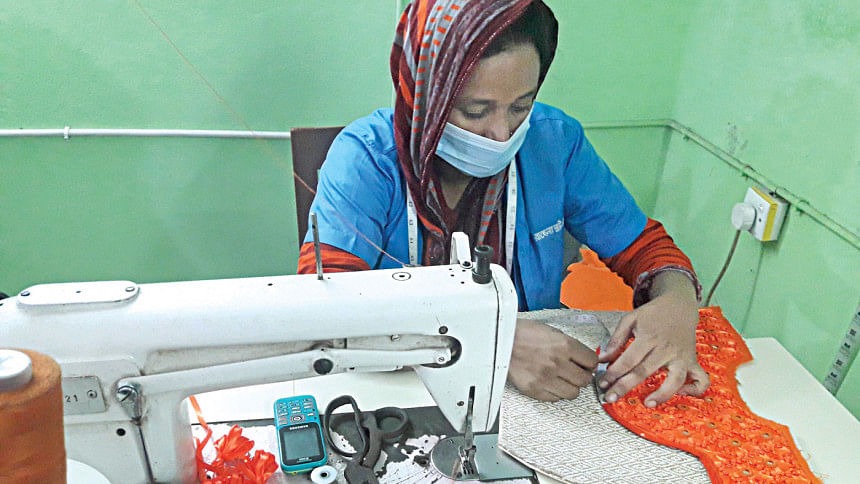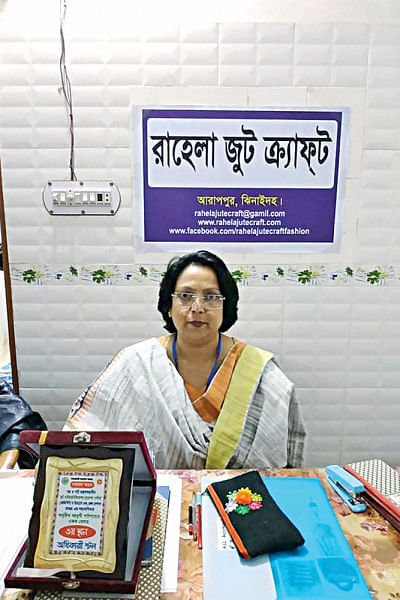Jute products from Jhenaidah break into export markets

She did not have full backing from her family, money was in short supply, and she had to struggle in a male-dominated business environment, but Shamim Ara Dipa didn't give up on her childhood dreams of doing something unique on her own.
Today, the owner of Rahela Jute Craft leads a small but steadily growing enterprise that specialises in making products from jute fabrics for both local and export markets.
She has two factories -- one in Jhenaidah and the other in Dhaka. She opened two showrooms, both located in the capital's Bijoy Sarani area.
She exports products to nine countries, including India, China, Nepal, Thailand, Canada, Italy and Hong Kong. She employs more than 200 impoverished women as workers.
"I always wanted to do something novel," the entrepreneur told The Daily Star.

She had been fashion-conscious from her childhood. "I used to design and make my dress when I was a student in the eighth grade. I liked to make unique things."
Dipa set out to materialise her dreams in 2003, when she attended her first training.
Her daughter was going to school in Dhaka at the time and her husband, then a general manager of a major business group, asked her to devote her time to taking care of the family.
She made sure that the family ran well. She would drop her daughter at school or a coaching centre and secretly take part in training programmes.
She started by selling hand-designed woven fabrics. She would buy plain fabrics, design them on her own and sell them among acquittances and relatives.
She earned some money and bought her first sewing machine in 2009 after finding out that it would not bring much success. She switched to jute fabrics.
At the time, Dipa, who completed diploma on fashion design from the National Institute of Fashion and Technology in 2006, was the only worker. She designed the product, made them, marketed and sold them to shops in markets and fairs.
In 2011, she participated in a fair and had good sales, which allowed her to buy more sewing machines and employ two permanent staff.
Since then, there was no looking back.
Now, she has 15 permanent workers. Another 200 women work from home, and when they finish their products, they supply them to the office and receive payments.
Her main factory is located near Arappur bus stand in Jhenaidah district town. She named the company after her mother-in-law as she helped her a lot along the journey.
Items like panjabi, slipper, file folder, laptop bag, office bag, vanity bag, purse, college bag, student bag, grocery bag and shopping bags are made from jute fabrics.
The jute ministry and the SME Foundation sent samples of her products to various fairs in other countries. She also takes part in such fairs under their arrangements. These helped her widen her footprint in foreign markets.
Dipa did not receive much support from banks, at least in the first seven years of her entrepreneurship.
The managing director of a state-run bank visited a training programme of the Small & Cottage Industries Training Institute (SCITI) in Uttara under the Bangladesh Small and Cottage Industries Corporation (BSCIC) in 2011. The CEO had said that the lender would lend Tk 1 lakh to prospective entrepreneurs without any collateral.
Accordingly, Dipa, who was also a participant at the training, went to a branch of the bank, but she had to return empty-handed as it did not give the money.
She received her first loan in 2017, when Sonali Bank gave her Tk 50,000. This was after a local friend in Jhenaidah who is also rich and influential gave the guarantee.
The bank has extended a cash credit loan facility of Tk 5 lakh.
The entrepreneur incurred a huge loss due to the pandemic, but she has got no government support as of now.
She had approached Sonali Bank to secure loans from the government's stimulus packages for small producers. With the money, she wanted to pay the wages and bonuses of her workers during the pandemic as her finances dried because of the drop in sales caused by the pandemic-induced lockdown.
But the bank said she had to keep collateral to get the loans.
"I work with 200 disadvantaged women. I had been without work orders for three months because of the pandemic-induced lockdown. But the bank did not listen," Dipa said.
In September last year, non-bank financial institution IDLC Finance lent her Tk 10 lakh.
She exported jute goods worth Tk 8 lakh in 2020, down from Tk 20 lakh to Tk 22 lakh per annum in the years before the pandemic.
Despite the pandemic, she has not laid off a single worker and paid the full three months' salaries even though they did not work during the period.
"I had to take a lot of pains to develop their skills. My products are unique. If I lay them off, I will not get skilled workers like them."
"Dipa is a sincere entrepreneur. She thinks differently," said Saidul Karim Mintoo, president of the Jhenaidah Chamber of Commerce.
Dipa plans to set up a factory on her own land as the current one is located on a rented property.
She has been trying for two years to secure a plot at the BSCIC in Jhenaidah to set up a factory where 300 to 400 women workers would be directly employed.
"I have not given up hope. I may get a large order from Canada. If I get the order, I will have some money. Then, I will revive the efforts to secure the plot at the BSCIC."
Dipa is now strengthening her presence on the digital platform. Her husband, who has retired, and their daughter now help her run digital marketing.
Dipa has a big dream: "I want to export my products to every country in the world."

 For all latest news, follow The Daily Star's Google News channel.
For all latest news, follow The Daily Star's Google News channel. 



Comments